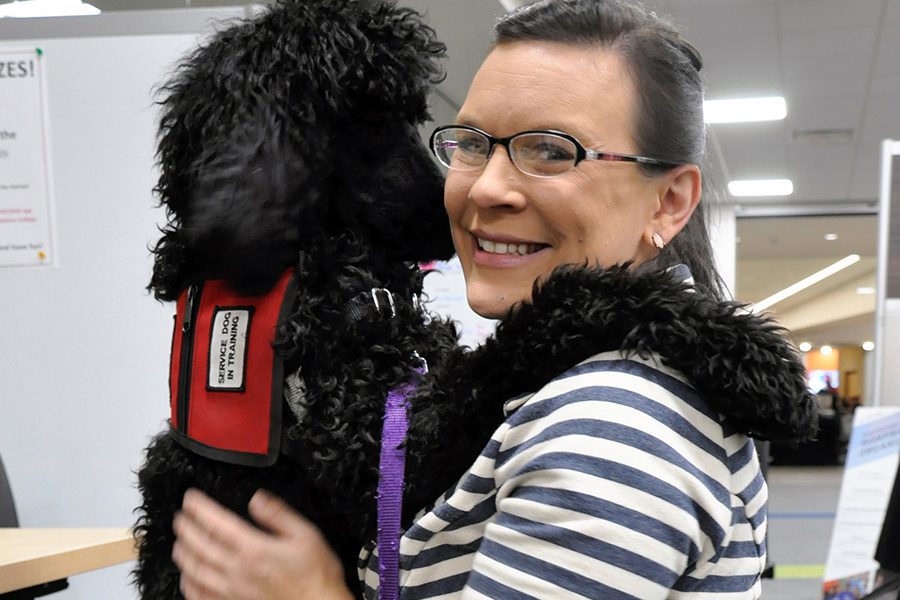More than a companion: Service dogs like Juliet improve the lives of people who need extra assistance
Juliet gives her trainer, Heather Morgan, a hug during a recent visit to the Madison College Student Life Center.
November 7, 2017
It is a special moment to receive a hug from Juliet, a service dog in training who is frequently found in the Madison College Student Life Center.
Hugging is just one of the things Juliet is learning how to do as part of her training. She is learning multiple different skills that will benefit her future owner, including being able to open doors with a press of her nose on a button and to gently tug on clothing to help her owner get dressed.
Dogs like Juliet improve the lives of people who need extra assistance, including people with autism, mobility issues and PTSD. But not everyone who needs a service dog is able to receive them.
“Right now there is a two to five year waiting list for a person to receive a dog,” explained Juliet’s trainer, Heather Morgan. This means that the people who could benefit greatly from service dogs like Juliet have to wait for years and years to receive the help that a service dog offers.
It is not just outside the walls of Madison College where people in need of service dogs are struggling, however.
“There a lot of people I know who go to college here that are on waiting lists to receive service dogs,” said Morgan.
The reason so many people are without service animals that could positively affect their life is because there is a lack of people taking in the dogs to be trained.
“The reason why the list is so long is because there’s not puppy raisers to raise the puppy past puppy stage, help with the training, and then get them fully trained to go home with somebody who needs them,” said Morgan.
Being a puppy raiser has its challenges both financially and time-wise, as raising and training a service dog is a volunteer effort. What some puppy raisers, including Morgan, see as their biggest challenge, however, is giving the dog away after creating a bond with the dog.
Though Morgan expects the separation from Juliet to be difficult, she sees the value of her work whenever she is able to interact with a family whose lives have been improved by having a service dog.
“We were at the children’s museum, and I saw somebody who had a service dog with them and a very autistic child, and I had a discussion with the father about how the dog has impacted them. They said with this dog, they no longer have the fear of their child running off and getting lost … They have this sense of security now,” said Morgan.
“Knowing that (Juliet) is going to go on to a home to somebody that is going to need her to enhance their independence, that is going to be the most rewarding experience. It’s going to be hard, but I know she is going to help someone immensely someday.”
While Juliet is still in the process of being trained, she can be spotted around the campus of Madison College regularly. Part of Juliet’s training is to be exposed to diverse types of people. Since Madison College has such a diverse student body, it makes it an ideal training location.
Being at the college is just as beneficial for Juliet as it is the people around her. Both students and staff are able to experience some stress relief by being with Juliet.
“Whenever people are stressed out, she’s right here, and she gives great hugs,” explains Allison Hoering, Volunteer Center executive director.
Brenda Farrell, Student Life administrative planner, explains that having Juliet in the Student Life Center so often “brings a sense of calm and stress relief to the office, and I think she should be here all the time.”
“I feel like I’m doing a service for people here at Madison College by her being a part of the college,” said Morgan.
She also hope to inspire others to consider becoming puppy raisers.
“I think her being here, too, has also brought awareness to people who could potentially be puppy raisers, and maybe reduce the list of people on the waiting list,” said Morgan.
For information on becoming a puppy trainer, check out customcanines.org.































